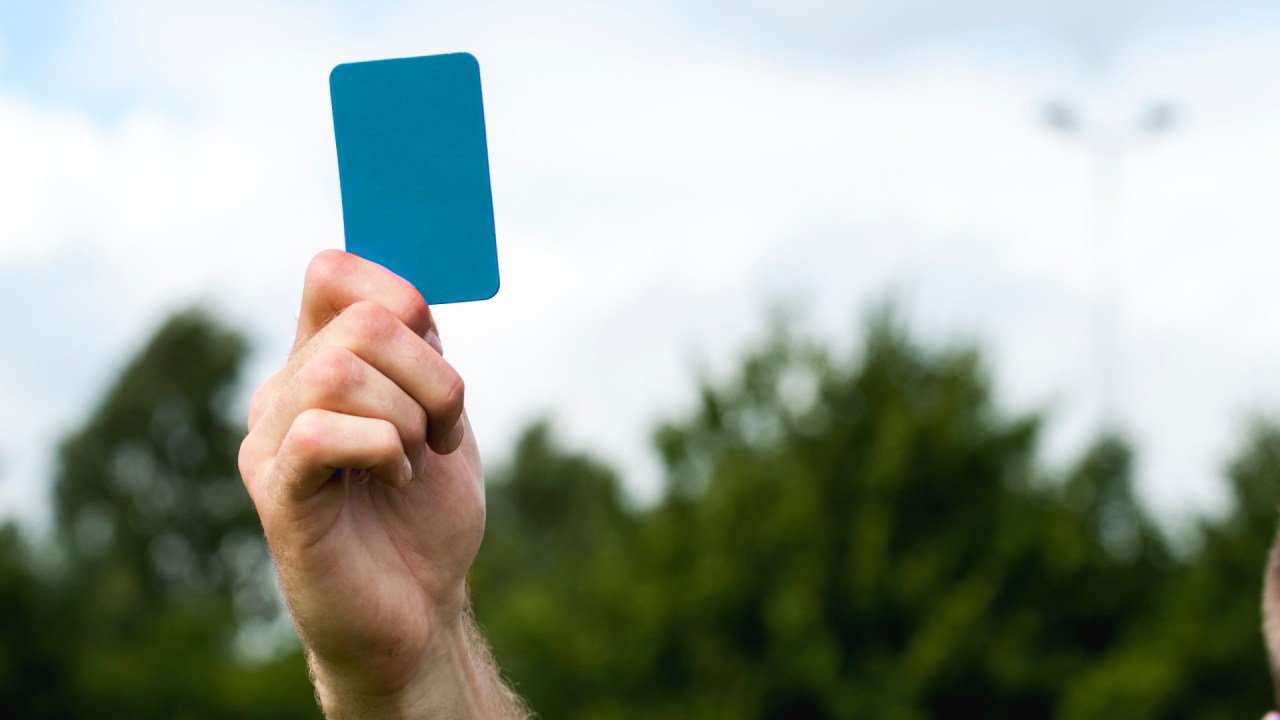Football is becoming a testing ground for every madcap idea the supposed guardians of the sport can come up with. The latest is the blue card, a stopgap between the yellow and red cards for bookings and sendings off, designed to send players to a sin bin for ten minutes should they commit one of two offences: dissent or cynical fouls to prevent a goalscoring opportunity.
It’s clearly designed to jazz up the game for a global television audience
Sure, it works in rugby and ice hockey and something called roller derby where a brief period of numerical advantage can make a big difference. But as any football fan knows, this is less certain in the beautiful game. Introduce a ten minute 10 vs 11 period into a football match and you can guarantee the depleted side will simply pack the defence for 600 seconds of stupefying non-action.
It’s clearly designed to jazz up the game for a global television audience rather than for those of us who actually go to games, as I have been doing with Spurs for almost five decades as a season ticket holder. As if that wasn’t punishment enough, VAR has already sucked the joy out of many matches as we wait to see whether or not we can celebrate a goal being allowed or disallowed, depending which side you’re on.
It also means long periods of nothing happening while the game extends from 90 minutes to nearer two hours. Not a problem for those in front of the TV but mind-numbing for those of us at the games who, unfortunately, are now of least concern for football’s governors.
In this case it’s the idea of the International Football Association Board, another one of those governing bodies we rarely hear from until they say something stupid. The idea is to trial it at lower levels of the sport first – grass roots football initially. Of course, there’s already talk of having it in the FA Cup next season. Just to make it more complicated; if a player, having been given a blue card, then gets a yellow, it becomes a red. Refs are going to need a colour palette at this rate. And why stop there? At this rate we could end up with a ten tier system of offences, each with a different colour and each worth a different amount of points with various punishments depending on how many points have been racked up.
Naturally, there are those hailing it as the biggest change to refereeing since Ken Aston, the refereeing supremo for the 1966 World Cup, came up with the whole red and yellow card concept for the 1970 competition. Ken was a local celebrity for me growing up as, way before professional refs, his day job was as headmaster at my local primary school in Ilford. As such, all he wanted was to improve the game for spectators, not for his own ego. He got the red and yellow idea while waiting at traffic lights and, rightly, thought it would be a better way of showing fans and players alike what was going on. But it was not introducing a completely new rule, just an adjustment to an existing one.
Every new idea proposed these days seems to be taking the game away from the ordinary, match-going fan while being a desperate attempt to show America, Africa and Asia that football can ‘move with the times.’ And let’s not forget those dodgy sports-washing Middle Eastern dictatorships that are desperate to join in a globally popular sport that had never interested them in the past.
Fortunately, many daft ideas fell by the wayside early – a 39th Premier League game to be played abroad, splitting a match into thirds rather than two halves to allow more TV advertising, moving the offside line from the halfway line to nearer the goal and so on.
Unfortunately some developments remain. The modern fan still has to cope with trying to get home after travelling hundreds of miles to see away games on a Friday night or Sunday afternoon thanks to the TV companies. Then there are minor bugbears such as fans filming themselves watching the game, half and half scarves, overpriced ticket prices (and the food and drink inside the stadium), a new replica kit every season with shirts for kids emblazoned with betting company logos and costing up to anything up to £90 or more.
Football is not alone in introducing new rules, formats and versions to try and draw in a younger and more international audience – cricket, for instance has the Hundred, 20/20 and day-night games yet the traditional five day test match still remains the best and most exciting format of all. Surely there is a lesson there.
Football is dogged by cheating, it always has been. IFAB claims bad behaviour by players ‘might be the cancer that kills football’. I suggest too many new rules might do that instead. There is a simpler solution. The first time a player is guilty of dissent, book him (or her). Any other player who does so after that gets sent off. If a yellow card is not enough of a punishment for cynical fouls (it isn’t in my view) then give them a red. No in between. When Italy’s Giorgio Chiellini pulled back England’s Bukayo Saka by his shirt in the 2020 Euro final, he was booked but should have been sent off.
And tighten up on other cheating. Faking injury to stop a game? Yellow card straight away. Goalkeepers deliberately wasting time on taking a goal kick? Yellow card for the first offence and a red for the second. Refs say they add time onto the game but this rarely stops bad behaviour from happening in the first place. Some teams have a preplanned system where a dangerous opponent is constantly fouled, each time by a different player. So introduce a rule that stops this. For instance, the second time a Saka or Maddison or Salah gets brought down, book the player who does it and book every player who does it consequently whether it’s their first offence or not.
On behalf of fair-minded football fans everywhere, I’d also introduce an immediate red card for Brentford’s Neil Maupay the moment he opens his mouth – but that’s just me. Blue cards have been given the green light, say the headlines. Blue cards given the red card would be better.







Comments